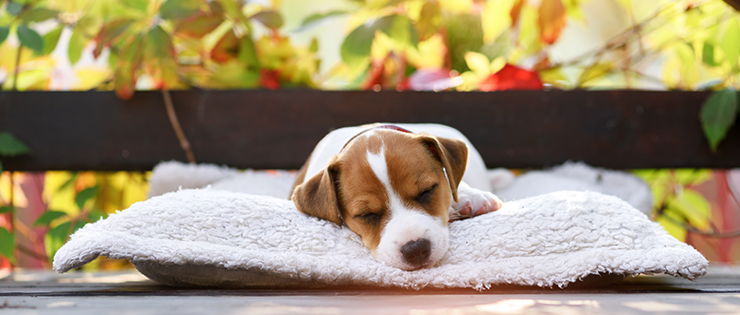
You might have seen that equally amusing and distressing YouTube clip of the dog running whilst laying down in his sleep. He runs so fast that by the end and still unconscious, he makes unharmed contact with the wall. If you haven’t viewed this viral video, you will laugh, but then like me; you will probably feel a little bad about it.
Dogs undoubtedly dream. In fact, many mammals and birds succumb to expressing their unconscious, including rats, pigs and sheep. We might be different in countless ways to a dog, but when it comes to brain waves, particularly during the Rapid Eye Movement Stage (REM), the period of sleep where our dreams are most vivid, the human and canine brain can become indistinguishable. REM sleep is the stage of sleep where you are most conscious in your unconscious. In other words, it is when your brain is most active and comparable to what you experience during consciousness. It is because of this that the REM sleep is when dogs are most likely to re-live aspects of their day. If you’ve witnessed your dog in REM sleep, his eyes will move around, and his paws may twitch a little. There’s a good chance he is re-living that time the rabbit who got away, or that time he played in the park with that new squeaky toy you bought him. His eyes move around not because he is embodying Wiliam Friedkin’s Regan from The Exorcist, but because he is actually looking at the images of his dream. How fascinating!
Sigmund Freud’s psychoanalysis theorised that dreams were a manifestation of a person’s desires and anxieties, most often due to repressed childhood memories. Whilst I am not convinced Freud’s analysis is transferrable to a dog’s mind or their puppyhood, it does make you appreciate that there is a complexity to the unconscious that we do not completely understand. Research of lab rats experiencing REM sleep showed that certain brain waves during sleep could be matched to certain activities during consciousness. This meant that scientists could, in theory, pinpoint exactly what the rats were dreaming about at different points. Whilst there are some variables that may confound this data, it is once again fascinating to think we could possibly identify what our dogs are thinking about when they are asleep too!
Dogs sleep much more than humans do, in fact they sleep at least twice as much as us. Does this mean they are more susceptible to REM sleep and therefore more dreaming? Whilst we are not entirely sure of the purpose of dreaming, some theorise that it has function in consolidating what has been learnt, along with storage of these memories for future use. This could be particularly useful for dogs analysing threats, locating food, or deciphering which dogs are most social at the park. Maybe, dogs who look like they’re chasing rabbits, are in fact practising! In truth, we don’t really know definitively what they are seeing in their unconscious vision, but we can postulate, can’t we. Besides, it is much more comforting believing that our dogs are chasing rabbits, rather than practising escaping something they are morbidly afraid of. Either way however, there seems to be use for dreams.
The mind of all intelligent life does and will continue to perplex us. We want to know everything about the psyche, particularly when it comes to our own species as well as our best four-legged friends. If dreaming is a manifestation of memory storage, we may be more likely to see our dogs twitch, squeal and eye-roll more after a big day out. The more enriching a dog’s life, the more likely they may be to dream. Alternatively, if a dog has been exposed to a grand life event, or is in some way distressed, they also may be more likely to dream, according to this theory. So, dreaming may not just be an indicator of the kind of day your dog has had, it could also tell you a little about how they have been feeling inside!